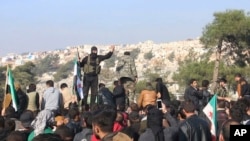A powerful Islamist militant group should be included in a Russian-Turkish deal to sustain a cease-fire and prevent a new humanitarian crisis in northwest Syria, said an international conflict prevention group.
The Brussels-based International Crisis Group (ICG) said in report, released Friday, that Hayat Tahrir al-Sham (HTS), an armed group designated as a terrorist organization by the United States, Russia and Turkey, is too entrenched to be defeated militarily without killing a large number of civilians in the restive Syrian province of Idlib.
“All actors should seek a more sustainable cease-fire -- optimally including HTS, notwithstanding legitimate concerns about the group – that avoids the high military, political and humanitarian price of another offensive,” the report said.
HTS is a former al-Qaida branch in Syria. It was previously known as Jabhat al-Nusra.
With about 20,000 fighting members, it is considered the most dominant militant group in Idlib, a last major rebel stronghold for Syrian rebels. The U.N. says nearly 2.6 million civilians live in the enclave. Rights groups have accused HTS of committing war crimes in Syria’s conflict.
“Our recommendation is for HTS to be included in the cease-fire agreement, not the negotiation process,” Joost Hiltermann, director of ICG’s Middle East and North Africa program, told VOA.
“HTS severed ties with al-Qaida in 2017, and since then has attempted to recast itself as a Syrian ‘rebel group,’ rather than a transnational jihadist one, by pushing out some foreign fighters and other hardliners from its leadership,” he said.
Fragile cease-fire
In March, Turkish President Recep Tayyip Erdogan and Russian President Vladimir Putin announced a new cease-fire that included establishing a “security corridor” in Idlib, where joint Russian-Turkish patrols would take place. The agreement halted a major Russian-backed Syrian government offensive to retake Idlib.
The deal, however, remains shaky as locals have expressed their opposition to the presence of Russian patrols in their areas. Turkey already maintains about a dozen military posts in Idlib.
“Idlib’s fragile cease-fire remains at great risk of falling apart,” the ICG report said.
Charles Lister, a Syria scholar at the Washington-based Middle East Institute, views the report’s key recommendation is “brave and forward-looking.”
“If HTS’s current leadership is serious about reforming itself in small but meaningful ways, it should be tested and challenged and the easiest way to do so would be to make it party to a serious multinational cease-fire agreement,” he told VOA.
Prospects of success or failure
Hassan Hassan, a Syria expert and co-author of the book “ISIS: Inside the Army of Terror,” sees bigger advantages with HTS being a party to the cease-fire in Idlib.
“HTS is now at a comfortable position, as a dominant force in that area, to show maximum flexibility,” he said. “Such flexibility will also draw a wedge between it and more extreme jihadist forces.”
In addition to HTS and Turkish-backed rebels, several jihadist groups, such as the Turkistan Islamic Party and Hurras al-Din, have established a significant presence in Idlib.
Some experts believe it is hard for a radical group like HTS to morph into a more moderate force.
“HTS is following a blueprint to build a society in Syria that follows conservative Salafism, and which can be a safe haven for transnational jihadist operatives,” Nicholas Heras, director of the Middle East program at the Institute for the Study of War, told VOA.
“Asking HTS to become a moderate group is like asking a wolf to stop eating meat, it’s fruitless,” Heras added.
‘Weakening US influence’
Despite halting its military offensive on Idlib, the Syrian government has vowed to retake “every inch of Syrian soil.” But, according to the ICG report, a conclusive military victory for government forces in Idlib depends largely on whether Russia backs the offensive with airstrikes.
“Russia’s geostrategic considerations include drawing Ankara closer to Moscow at Washington’s expense, thus driving a wedge in the NATO alliance and weakening U.S. influence. An all-out assault on Idlib would put Russian relations with Turkey at risk,” the ICG said.
The U.S., which doesn’t have a military presence in northwestern Syria, has expressed support to its NATO ally, Turkey, in the Idlib crisis.
In March, U.S. Special Envoy to Syria James Jeffrey suggested that his country was willing to provide “ammunition” to Turkish military in Idlib.
Recently, Jeffrey said he hoped Turkey would maintain pressure on militant groups in Idlib, including the HTS.
“We hope to see the Turks continue to put pressure on the terrorist organizations there, the most powerful of them Hayat Tahrir al-Sham,” he said during an online event held by the Atlantic Council in Washington.




